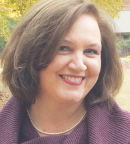
“Now that I’ve completed my breast cancer treatments, I’m committed to reaching my weight-loss goals through a healthy diet and exercise program.”— Karen Cochrane, MSN, RN
Tweet this quote
Fifteen years ago, my internist advised me to lose weight. But after seeing the yo-yo effects of dieting on friends and colleagues, I knew I would find the process of losing weight and gaining it back frustrating, so I ignored my physician’s advice. It wasn’t until I was diagnosed late this past year with stage I estrogen and progesterone receptor–positive, HER2-negative invasive ductal carcinoma that I began to understand the association between weight and the development of cancer. It was startling for me to learn that my weight may have fueled the onset of my breast cancer. Now, I’m doing everything I can to prevent a recurrence.
After undergoing a lumpectomy to remove the tumor in my left breast, I had four rounds of a combination regimen of docetaxel and cyclophosphamide and just completed radiation therapy to kill off any remaining malignant cells. I’m also engaged in a weight loss and exercise program to give myself the best shot at a cure.
Preventing Cancer Recurrence
After my diagnosis, my oncology team told me about a clinical trial it was launching, the Effects of Diet and Exercise on Early Stage Breast Cancer, and I decided to enroll in the study. I wanted to participate in the study not just to help myself lose weight, but to help researchers learn what they could about the potential impact diet and exercise have on the prevention of recurrence, new breast cancer events, and mortality as well.
The study provided me with the expertise of a dietician, who developed a short-term dietary plan that restricted caloric intake, and an exercise physiologist, who created a fitness routine for me that consists of 30 minutes of physical activity each day as well as strength-building exercises. Within 3 weeks, I lost 10 pounds, and now that I’ve completed my breast cancer treatments, I’m committed to reaching my weight-loss goals through a healthy diet and exercise program.
I’ve learned how to track what I’m eating to make sure I’m getting enough protein and to see the amount of carbohydrates, fats, and sodium I’m consuming. The process has been eye-opening and is helping me make better decisions about food that are based on good nutrition rather than emotional impulse. Although I have more weight to lose, I already feel better physically, and my self-esteem has improved markedly.
Talking to Patients About Weight Loss
As a health-care professional myself, I was well informed about the role of diet and exercise on our general health, but I needed the support and encouragement of members of my oncology team to help me reach my weight loss goals once I was diagnosed with cancer. Throughout the study, I was able to speak with the dietician and exercise physiologist on a weekly basis, and they helped me maintain my progress. I also had ongoing conversations with my oncologist about how best to meet my nutritional needs as I was undergoing chemotherapy. Her input and encouragement were invaluable to me.
I know how difficult it can be to raise the issue of weight with patients, especially when the focus is on treating and, hopefully, curing a patient’s cancer, but that discomfort shouldn’t discourage oncologists from broaching the subject with their overweight patients or patients with obesity, because it may ultimately mean a better outcome for them. And the discussion may have to take place over multiple office visits and include resources for both clinical practice-based and community-based weight management and physical activity programs.
Cancer Has Left Its Mark
With my cancer treatment nearly completed, I’m beginning to put cancer behind me, but the experience has been a reminder that we are all mortal. I’m hoping my efforts to lose weight will pay off—not just in improving my day-to-day quality of life, but in reducing my chances of a cancer recurrence as well.
I have two teenage children and a loving husband, and cancer has brought our family even closer than it was before my diagnosis, but it has also robbed us of our innocence. We are now more aware that we can’t take anything for granted. We know we have to be diligent about maintaining cancer-screening schedules and making healthy lifestyle choices.
I’m anxious to get back to the life I had before my diagnosis, but the experience of cancer has left an indelible mark. Hopefully, the lifestyle changes I’ve made will mean a longer and healthier cancer-free life. ■
Ms. Cochrane is an Educator in Patient Health and Safety Information at Children’s of Alabama, a pediatric health system in Birmingham. She lives with her husband and two children in Hoover, Alabama.

